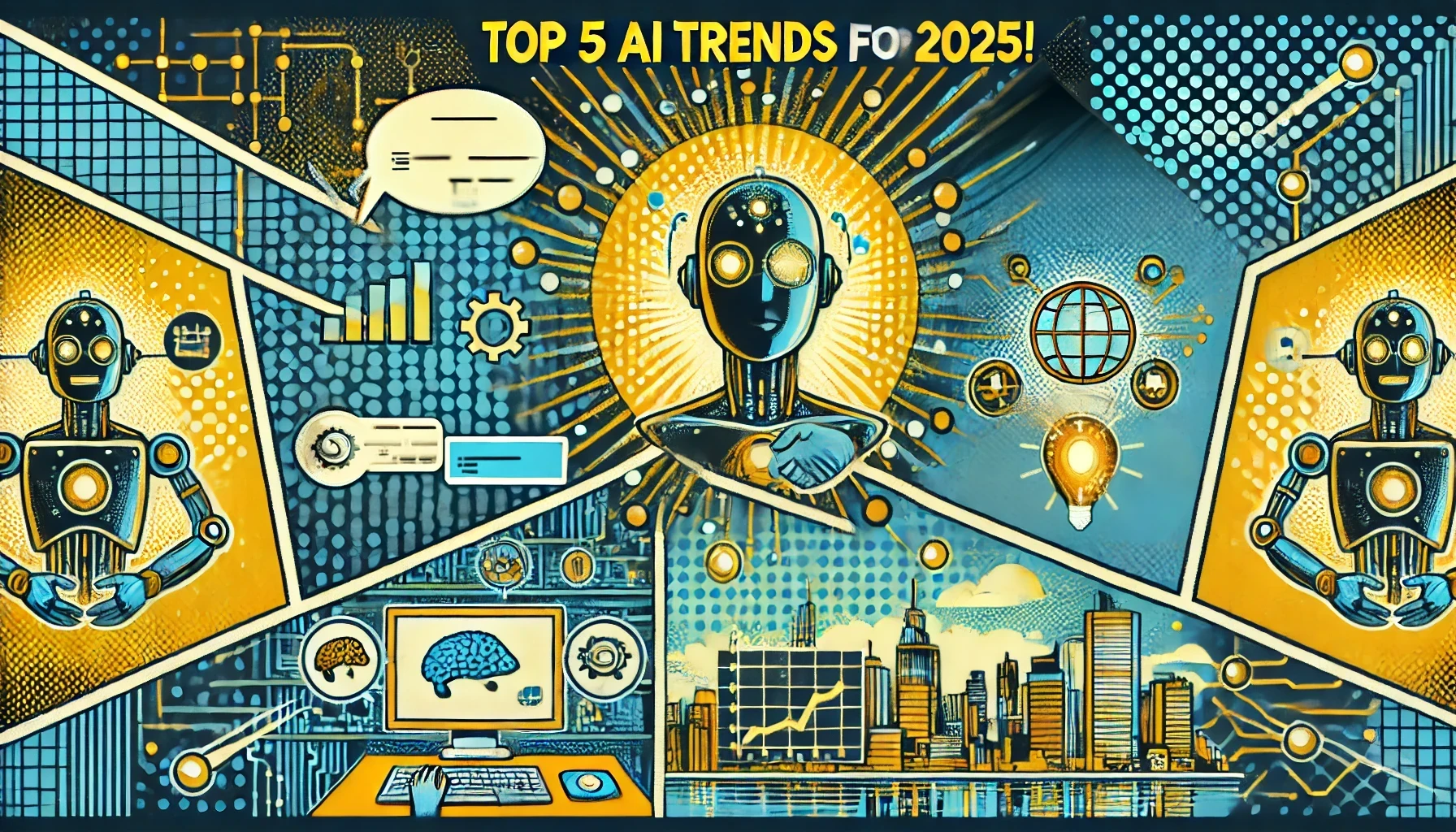
AI in 2025: Autonomous Agents and Profitability Take Center Stage, Say Industry Leaders
AI Trends 2025 .At the Reuters NEXT conference held on April 30, 2025, in New York City, top technology executives unveiled their predictions and priorities for artificial intelligence (AI) in the upcoming year. A major theme that resonated throughout the event was the rise of autonomous AI agents—self-operating digital systems capable of managing complex workflows—and a new focus on financial sustainability within the AI sector. Leading voices from OpenAI, Google, Amazon Web Services, and Northzone emphasized that 2025 will not only be a year of accelerated innovation but also of heightened accountability, where profitability and practicality take center stage.
Over the last few years, the field of artificial intelligence has undergone transformative shifts, progressing from novel experimentation to essential infrastructure for modern business. Early large language models (LLMs) like GPT-2 and GPT-3 brought AI to public attention, but the emphasis was mostly on scale and capabilities. With the 2023 release of multimodal models and breakthroughs in agentic behavior, the potential of AI became more applicable to everyday work environments. However, 2024 marked a turning point—venture capital tightened, tech valuations dropped, and investors began demanding more concrete results. AI companies could no longer rely on hype alone.
In this climate, autonomous agents emerged as a practical response. These digital entities, often powered by fine-tuned LLMs and connected APIs, are designed to perform sequences of tasks on behalf of humans without step-by-step input. Unlike traditional software, they can operate flexibly across platforms and domains, often collaborating with other agents or adjusting based on feedback. Simultaneously, the pursuit of artificial general intelligence (AGI) has continued to inspire speculation. AGI, once viewed as a distant dream, now seems within reach, with top researchers estimating its arrival within the decade—if not sooner. This has only increased pressure on companies to develop agentic systems that demonstrate both capability and responsibility.
AI Trends 2025 Facts & Main Details
Rise of Autonomous AI Agents: Autonomous agents have rapidly transitioned from theory to application. These AI tools can perform time-consuming tasks such as scheduling meetings across time zones, conducting in-depth data analysis, placing online orders, managing CRM systems, and even initiating customer communication—all without direct supervision. Sarah Friar, CFO of OpenAI, emphasized the urgency and scale of change, saying, “We’re going to see a lot of motion next year around agents, and I think people are going to be surprised at how fast this technology comes at us.” Companies are now racing to integrate these capabilities into their core operations, with many seeing agents as the key to digital transformation.
Profitability Becomes a Priority: Venture capital firm Northzone offered a clear message: growth without profits is no longer enough. Partner Molly Alter stated, “2025 will be the year of profitability for AI,” signaling a fundamental change in investor expectations. While 2024 was about user acquisition, platform reach, and data accumulation, the current moment requires AI companies to focus on improving operational margins, reducing overhead costs, and creating value for clients. “Instead of ‘grow, grow, grow,’ now it’s ‘Wow, if I use AI, my margins are going up.’” AI startups and enterprises alike are being challenged to prove that their tools not only work—but pay off.
Corporate Adoption of Agentic AI: One of the most prominent examples of practical agent integration is the Bank of New York Mellon. CEO Robin Vince shared that thousands of employees have begun using in-house LLM-powered tools to enhance workflow. These include AI agents that generate reports, summarize client interactions, and surface hidden patterns in large datasets. Vince noted, “We have tools live that create more leverage for our people, create solutions for clients, and provide insights that would have been nearly impossible to find through traditional means.” The bank is positioning AI not as a threat to jobs, but as a multiplier of human expertise.
Big Tech Investment in Agent AI: Amazon Web Services (AWS), the cloud infrastructure giant, has launched a dedicated division focused on advancing agentic AI. Led by Swami Sivasubramanian, the initiative seeks to integrate agents into everyday life—from automatically reordering household items to streamlining IT workflows. AWS views agent AI not just as a technical leap, but as a new business category with enormous revenue potential. Sivasubramanian explained that agentic systems could become as integral to digital life as mobile apps or voice assistants once were a decade ago.
Google’s Agentic Era: Google has been pushing boundaries with its Gemini AI model family. The recent release of Gemini 2 marked a major leap forward in multimodal reasoning, task planning, and real-world contextual awareness. CEO Sundar Pichai referred to this shift as the dawn of “a new agentic era.” Unlike traditional AI assistants that simply answer questions, Gemini 2 is engineered to take initiative. It can complete multistep processes, react to changing information, and act on a user’s behalf with optional human feedback loops. Google envisions a future where digital agents will become trusted co-workers and personal advisors.
AI Trends 2025 Analysis & Impact:
Impacts on the Technology Sector: Autonomous AI agents are set to revolutionize enterprise IT infrastructure and SaaS platforms. By offloading repetitive or cognitive-heavy tasks, businesses can achieve higher throughput with fewer human hours. For sectors like finance, logistics, healthcare, and e-commerce, these agents will reduce turnaround time, enhance accuracy, and allow staff to focus on strategic goals. New products are being designed with “agent-in-the-loop” architectures, where human-AI collaboration becomes the standard. This is not just about automation—it’s about augmentation at scale.
Financial Sustainability & Business Models: The push toward profitability is triggering innovation in AI monetization strategies. SaaS companies are restructuring licenses around usage-based pricing and performance-linked subscriptions. Cloud providers are bundling agent capabilities with existing infrastructure services, incentivizing enterprise clients to expand usage. Meanwhile, startups are exploring “agent marketplaces” where users can deploy task-specific agents on demand. The challenge remains: how can these services remain affordable, maintain quality, and avoid ballooning compute costs? These are questions that every major AI company must now answer.
Challenges and Ethical Questions: Despite the promise of agentic AI, experts warn of complex challenges. Ensuring agent transparency is essential—users need to understand what an agent is doing and why. There is also the risk of goal misalignment, where an agent might achieve its task in ways that conflict with ethical norms or organizational policies. Regulators are watching closely, and calls for clearer accountability, documentation, and audit trails are growing. In addition, the issue of data security is heightened when agents have autonomy to access, manipulate, or share information across platforms.
Broader Implications for Labor and Society: The societal impact of AI agents could be vast. Jobs that are repetitive, rules-based, or document-intensive may be most affected. However, experts also see opportunities to re-skill workers and create new roles around agent supervision, training, and validation. Education systems may need to prepare students for hybrid workplaces where working with AI is as common as using email. At the same time, disparities in digital access must be addressed to ensure that the benefits of agentic AI are shared equitably.
Resources & References:
- Reuters – “Autonomous Agents and Profitability to Dominate AI Agenda in 2025”
- Northzone Investment Forecasts
- BNY Mellon Corporate AI Brief
- World Economic Forum Reports on AGI Readiness
- McKinsey & Company: The Business Value of AI Agents
Autonomous agents and the new profitability mindset are reshaping the trajectory of artificial intelligence. As AI becomes more capable, companies are moving beyond experimentation into deployment at scale—with real financial, operational, and societal implications. 2025 could go down in history as the year AI became indispensable.
What does the future of work look like when AI agents become our colleagues? How can we ensure that this new era uplifts rather than divides? Join the conversation, share your thoughts in the comments, and subscribe to AI Brief Now for trusted, in-depth updates on the AI evolution.


